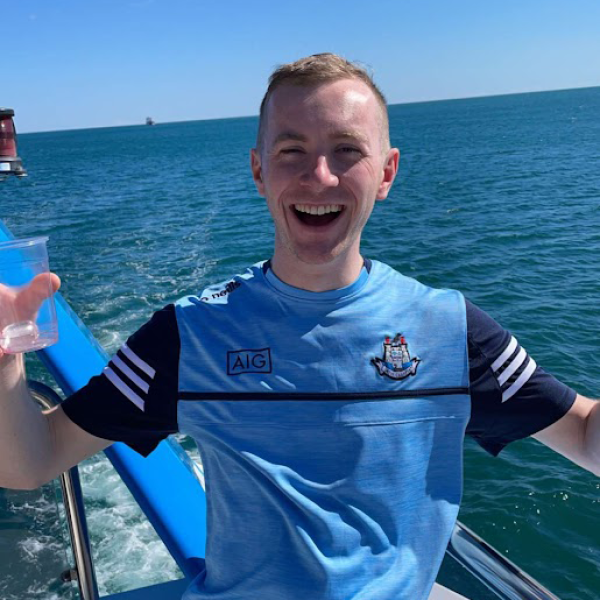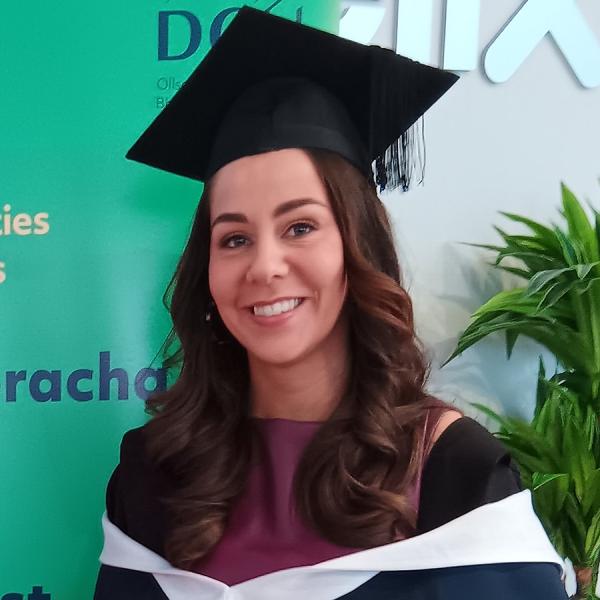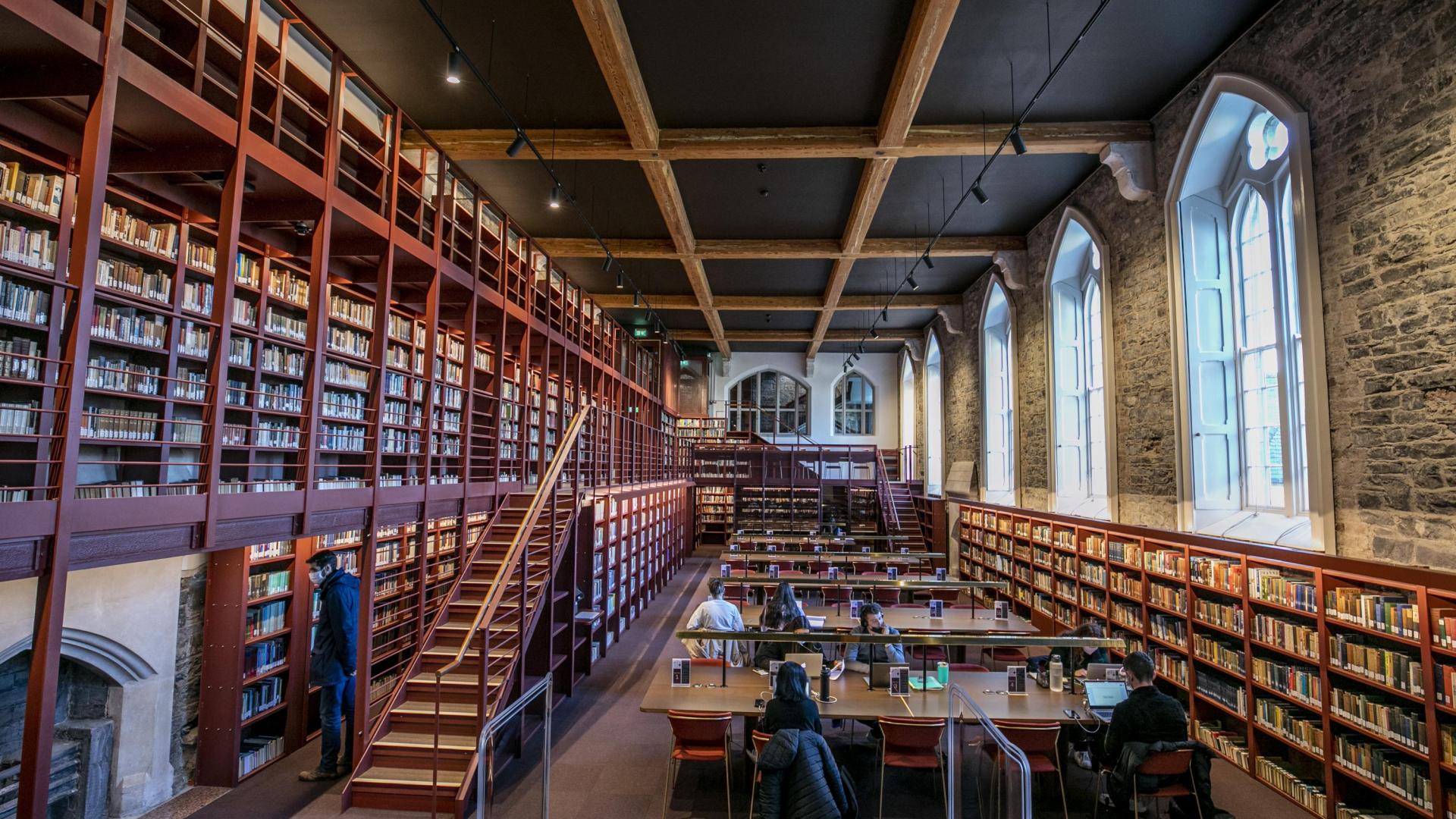Overview
Tá sé mar aidhm ag an MSc sa Bhainistíocht agus Gnó Digiteach mic léinn a ullmhú le bheith ag obair mar theicneolaithe, bainisteoirí, oideachasóirí, fiontraithe agus nuálaithe — róil a bhfuil an-tóir orthu i ngeilleagar faisnéise an lae inniu.
Is MSc páirtaimseartha atá ann. Múintear an cúrsa ar dhá Shatharn in aghaidh na míosa, thar dhá bhliain ar an gcampas i nGlas Naíon. Is ionann seo agus sé Satharn i ngach seimeastar.
Cuirtear an clár seo ar fáil de réir éilimh agus trí mheán na Gaeilge.
The MSc sa Bhainistíocht agus Gnó Digiteach (Management and Digital Business) is designed to produce the kind of digital business technologists, managers, educators, entrepreneurs and innovators in demand in today’s information economy.
It is a part-time MSc. The programme is taught on two Saturdays per month, over two years on the Glasnevin campus. This equates to six Saturdays in each semester.
This programme is run subject to demand and is delivered through the medium of Irish.
Why DCU
DCU People

Tá Dr Eoghan Mac Conaill Óig ag feidhmiú mar Ollamh Cúnta le Gnó agus mar Cathaoirleach MSc sa Bhainistíocht & Gnó Digiteach le Fiontar agus Scoil na Gaeilge in Ollscoil Chathair Bhai
Read more about Eoghan McConalogue

Roghnaigh mé an clár seo a dhéanamh, toisc go raibh suim agam máistreacht a dhéanamh sa ghnó.
Read more about Evan Downey

I chose the MSc sa Bhainistíocht agus Gnó Digiteach as my background is in the Arts and Education and I wanted to broaden my experience and qualifications in order to have a wider range o
Read more about Caitríona McAteer
Careers & Further Options
Careers
Tá céimithe an MSc sa Bhainistíocht agus Gnó Digiteach ag obair le Irish Mortgage Corporation, Google, Oracle, Make a Wish Foundation, Citi, RTÉ, Foras na Gaeilge, An Roinn Ealaíon Oidhreachta agus Gaeltachta, Coláiste na bhFiann, Gael Linn, Gaelchultúr, Údarás Craolacháin na hÉireann agus i bpostanna bainistíochta i scoileanna.
There is a high demand for graduates of this programme. Graduates of the MSc sa Bhainistíocht agus Gnó Digiteach work with the Irish Mortgage Corporation, Google, Oracle, Make a Wish Foundation, Citi, RTÉ, Foras na Gaeilge, Roinn Ealaíon Oidhreachta agus Gaeltachta, Coláiste na bhFiann, Gael Linn, Gaelchultúr, Údarás Craolacháin na hÉireann and managerial posts in schools.
- Advertising
- Banking
- Business
- Business Analyst
- Consultancy
- Digital Account Executive
- Education
- Education Leadership
- Information Technology
- Research
Entry Requirements
Riachtanas Iontrála
Céim onóracha (H2.2) nó taithí ghairmiúil oiriúnach agus leibhéal sásúil i labhairt agus scríobh na Gaeilge. Glactar le cáilíochtaí agus le taithí ghairmiúil oiriúnach i gcúinsí áirithe in ionad bunchéime, faoi réir ag rialacha na hOllscoile. Ní gá réamhcháilíochtaí ríomhaireachta ná gnó.
Entry Requirements
Honours degree (H2.2) or equivalent professional experience and a satisfactory level of fluency in Irish. In some circumstances appropriate professional experience and qualifications are accepted in lieu of a primary degree, subject to University regulations. Previous qualifications in business or computing are not required.
International Applications
International candidates are expected to have educational qualifications of a standard equivalent to those outlined above. In addition, where such candidates are non-native speakers of the English language they must satisfy the university of their competency in the English language.
Recognition of Prior Learning (RPL) applicants are required to submit a cover letter along with their application under the Transcripts section of the portal, affirming their intent to apply for RPL. For more information on RPL see here.
Due to the specialist nature of this programme, additional criteria may be used to assess suitability to undertake this programme. For further information, please contact the Programme Chair using the contact details above
Programme Structure
Thar tréimhse dhá bhliain, tugann mic léinn pháirtaimseartha faoi mhodúil i réimse topaicí a bhaineann leis an ngnó digiteach, bainistíocht agus ceannaireacht, agus cúrsaí straitéise agus margaíochta, chomh maith le tionscadal nó tráchtas sa taighde feidhmeach. Dearadh gach ceann de na modúil ar mhaithe le freastal ar threochtaí atá ag teacht chun cinn i saol na hoibre sa lá atá inniu ann.
Sna gnéithe den chúrsa a bhaineann leis an ngnó digiteach, líonraí agus na meáin, foghlaimeoidh mic léinn eolas agus scileanna teicniúla a chuirfidh ar a gcumas ábhar a chruthú agus cumarsáid a dhéanamh ar ardáin dhigiteacha, idir na cinn atá coitianta agus cinn atá ag teacht chun cinn. Forbróidh mic léinn tuiscint phraiticiúil ar an dea-chleachtas i ndearadh gréasáin, inúsáidteacht suíomhanna gréasáin, eispéireas an úsáideora agus feachtais agus tionscadail ríomhthráchtála.
Trí na modúil taighde agus bhainistíochta, díreofar ar na tuiscintí a theastaíonn i ngairmeacha bainistíochta agus ceannaireachta. Forbróidh mic léinn scileanna boga agus tras-scileanna, chomh maith le tuiscintí ar an tionchar a imríonn bunachair sonraí, an t-uathoibriú agus an mheaisínfhoghlaim ar chleachtais thraidisiúnta bhainistíochta.
Ar deireadh, beidh deis ag mic léinn tarraingt ar an taithí ghairmiúil, acadúil nó phearsanta atá acu féin, agus tabhairt faoi thionscadal taighde agus tráchtas a bhaineann lena sainréimsí spéise féin. Déanfar an obair seo faoi stiúir ball den fhoireann acadúil a bhfuil ardchailíochtaí agus taithí aige/aici.
Tabharfaidh na tascanna eile a dhéanfar i rith na bliana deis do mhic léinn a gcuid taighde, machnaimh agus saineolais a chur i bhfeidhm agus iad ag obair ar thionscadail shuimiúla a bhaineann lena gcúlraí agus réimsí spéise féin. Físeán faoin Ghaeilge
Seo liosta na modúl a ndéantar staidéar orthu:
- Modhanna Taighde
- Ceannaireacht
- Bainistíocht Acmhainní Daonna
- Bunachar Sonraí & Bainistiú Acmhainní Digiteacha
- Líonraí agus Forbairt Gnó
- Bainistíocht Straitéiseach
- Bainistíocht Tionscadal
- Airgeadas agus Scairbhileoga
- Margaíocht
- Ríomhthráchtáil & Feidhmiúcháin Idirlín
- Na hIlmheáin
Ar deireadh, déantar tráchtas a bhaineann le do réimse spéise féin.
Fees and Funding
Fees
How To Apply
All Applicants must submit
All Applicants must apply through DCU's Student Application Portal which is available here. Here's a quick step by step guide if you need help with your application:
- Certified academic transcripts for each and every year of study, with certified English translations, if applicable.
- Evidence of language competence (Gaelige)
Non Native English Speakers
- Evidence of English competency which meets DCU entry requirements - see https://www.dcu.ie/registry/english.shtml
Non-EU Applicants
Note if you are a non EU student and require a study visa, you are not eligible to apply for part-time programmes as study visas are only granted for full-time programmes.
Dates for Submission of Applications
Applications will be accepted on a rolling basis until the programme is full or until the following dates:
- Closing date for non EU applicants is 1st July 2025
- Closing date for EU applicants is 30th August 2025
All entry requirements should be met before the commencement of the programme.
Application Queries
For EU applicant queries, please visit https://www.dcu.ie/registry/eu-postgraduate-taught-admissions or email postgraduateadmissions@dcu.ie
For non EU applicant queries, please visit https://www.dcu.ie/registry/international-admissions-undergraduate-and-postgraduate or email internationaladmissions@dcu.ie
Commencement of Programme
The programme commences in September 2025
Life On Campus
At DCU, our students can expect a unique campus experience. We are known for our excellent teaching and learning facilities, our active clubs and societies, and our great social and sporting facilities. All this makes DCU an exciting place to be.
DCU has three academic campuses; Glasnevin, St. Patrick’s and All Hallows (both in Drumcondra), all close to Dublin City centre.
They can be reached by public transport, Dublin Bus and Bus Éireann, with our Drumcondra campuses a ten minute walk from Drumcondra Train Station. Glasnevin is a 20 minute walk from St Patrick’s and All Hallows. They are also linked by Dublin Bus.
Each campus has a library (O’Reilly, Cregan and Woodlock Hall), study spaces, restaurants, and on-campus residencies. There are sports facilities on Glasnevin and St. Patrick’s, and there is a dedicated sports campus, St Claire’s, located near Glasnevin on the Ballymun Road.
DCU’s 19,000 students have access to exceptional teaching and learning facilities across our three academic campuses.
These include modern learning theatres, research centres, a new media and TV studio, radio/podcast studios, computer suites and advanced labs in the areas of Languages, Engineering, Physics, Chemistry and Biotechnology, as well as a Sports Performance centre and a training hospital ward. In 2021, we opened our first virtual reality ‘Leadership Lab’, which is located in our Business School.
We continue to improve and update our facilities. For example, construction of a new world-class STEM facility is underway on the Glasnevin campus. With capacity for an extra 3,000 STEM students, this facility will advance DCU’s international reputation for excellence in science and health, computing and engineering disciplines.
Studying in DCU isn’t just about course work. The university is rich in student life and activities.
There are more than 140 clubs and societies for students in DCU, with ‘Clubs & Socs’ days taking place on both the Glasnevin and Drumcondra campuses at the start of the academic year. They span everything from rugby to rock climbing, anime to jazz.
For many students, sport is an important part of the DCU experience. DCU’s Sports Complex boasts a 25 metre swimming pool, fitness centre gym, all-weather pitches and squash courts, as well as soccer, GAA and rugby pitches. DCU Dóchas Éireann, the university’s GAA club, is the largest third level Gaelic Games club in the country. Meanwhile, DCU Athletics has been Ireland’s highest achieving university club for many years. And DCU has dozens of other clubs to get involved in, from Archery to Weightlifting.
The Glasnevin campus is home to our purpose built, state-of-the-art student centre, The U, which serves the needs of a rapidly growing student body. Here, you will find the Student Leadership and Lifeskills Centre, performing arts and cultural spaces for students and the wider community, and the Entrepreneurship and Innovation Hub. Also located on our Glasnevin campus is The Helix, our renowned performing arts centre.
On our St Patrick’s campus, we have the Java Student Hub, a vibrant, warm and welcoming space where students can meet for coffee, play music, use the projector to watch events, or just relax. The walls of the Java Hub were designed based on the cultural history of St Patrick’s Campus, including the special references to the notable sporting history and history of the arts.
We have a number of academic, professional and social supports for students.
Student Advice & Learning Skills Centre - Offers a wide range of supports and services to students and advice
The Writing Centre - drop-in writing workshops for students through the academic year
Maths Learning Centre - provides maths support for students of all ability levels with maths modules
Student Learning - facilitate the transition from passive to active learning for students at DCU, by teaching study skills, nurturing critical thinking and building student confidence.
Careers work with students to help them on their professional journey into graduate employment.
Our student support team offers a comprehensive support programme, helping students make that all important transition into university life and focusing on building confidence and skills which are key to success at third level.

DCU All Hallows Campus
FAQs
Is DCU all one campus?
DCU is a multi campus university - the Glasnevin, St Patrick's and All Hallows campuses. The St Patrick's campus is where the Education courses are taught and some of the subjects from the BA Joint Honours degree. There is a 20-25 minute walk between the campuses but there are buses and bikes available to go between them also.
Click here to see maps of all of our campuses
If I'm studying on the St Patrick's campus, can I use the library and sports centre on the Glasnevin campus?
Yes, all facilities such as sports and accommodation are open for all DCU students to avail of.
Are there libraries in DCU and if they have wifi and work stations?
We have a brand new state of the art four floor library on our St. Patrick's Campus which complements the existing library on the Glasnevin campus. There is free wifi, work stations as well as desktop computers.
Does DCU provide accommodation?
DCU does have on-campus accommodation for undergraduate and postgraduate students, and you can find out more and apply via the Accommodation Office webpage.






